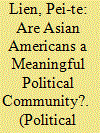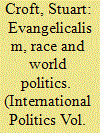| Srl | Item |
| 1 |
ID:
179419


|
|
|
| 2 |
ID:
186657


|
|
|
|
|
| Summary/Abstract |
Extending theories of social exclusion and elite messaging, we argue that Trump’s targeted rhetoric toward Asian Americans during the COVID-19 pandemic pushes the racial group, largely “Independent” or nonpartisan affiliated, to lean more towards the Democratic Party. We support this claim by combining social media (Study 1) and survey data (Study 2) analysis. Tracing 1.4 million tweets, we find that Trump’s rhetoric has popularized racially charged coronavirus-related terms and that exclusionary, anti-Asian attitudes have increased in the United States since the pandemic began. Next, by analyzing repeated cross-sectional weekly surveys of Asian Americans from July 2019 to May 2020 (n=12,907), we find that the group has leaned more towards the Democratic Party since Trump first made inflammatory remarks towards Asian Americans. Whites, Blacks, and Latina/os, on the other hand, exhibited fewer and less consistent changes in Democratic Party-related attitudes. Our findings suggest that experiences with social exclusion that are driven by elite sources further cement Asian Americans as Democrats.
|
|
|
|
|
|
|
|
|
|
|
|
|
|
|
|
| 3 |
ID:
105361


|
|
|
|
|
| Publication |
2011.
|
| Summary/Abstract |
American identities have traditionally been bound up with racial and religious markers - the WASP marker being for many, many decades and that which described the fullest state of American-ness. In the age of an African-American President, such conventional wisdoms are clearly challenged; and yet race and religion still describe different degrees of American-ness. This article investigates these identity themes not through the traditional duologue of white and African American, but seeks to understand in different communities how race and religion combine to produce different American-ness. Through an examination of two communities deemed problematic because of the high percentage of unchurched among them - First Peoples and Asian Americans - the article describes different processes at work. First Peoples are often seen in racial rather than national terms. The work of evangelicals 'among' such peoples is assessed within the United States and beyond. In contrast, Asian-American identities are often articulated through evangelism, particularly on the campuses of the United States. Together, these case studies show that American-ness is being redefined, to include new racial categories and groups newly empowered by their religious activity. This connects to issues of migration; evangelism is now active in America as well as beyond, as the world comes to live in the United States, traditional boundaries - inside/outside and white/African American - carry different and often less weight than hitherto has been the case.
|
|
|
|
|
|
|
|
|
|
|
|
|
|
|
|
| 4 |
ID:
180078


|
|
|
|
|
| Summary/Abstract |
Hate crimes against Asian Americans have risen sharply during the COVID-19 pandemic. A historical perspective shows that Asians have faced intertwined racial and gender-based biases in the United States since the first anti-immigration backlashes against their presence in the nineteenth century.
|
|
|
|
|
|
|
|
|
|
|
|
|
|
|
|